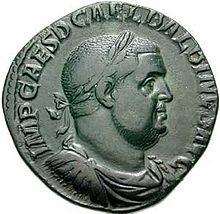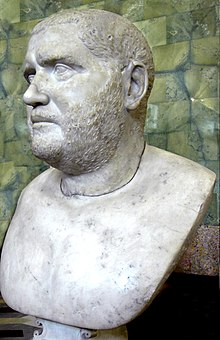Balbinus
Decimus Caelius Calvinus Balbinus (* before 178; † beginning [?] May 238 in Rome ) was Roman Emperor in the six- emperor year from late January or early February (?) 238 until his death a good three months later . He was elected by the Roman Senate together with Pupienus after Gordian I and Gordian II failed to defeat the emperor Maximinus Thrax , who had been declared an enemy of the state .
Domination
The election of Balbinus and Pupienus was a unique process, because normally the Senate only confirmed the elevation of a co-emperor by an existing ruler or the acclamation by the army; it was not intended that the Senate appoint a new Augustus on its own initiative . Probably for this reason, the committee could not agree on a candidate and therefore raised two. For the first time both Augusti were entrusted with the office of Pontifex Maximus . It turned out quickly that this was not the solution.
Mutual distrust
Because the short reign of the two emperors was marked by mutual distrust and the dislike of the Roman people towards them, which is said to be based on the time of Pupienus as a tough city prefect . After their appointment by the Senate - an unusual occurrence - the two had to leave the Capitol under the protection of a quickly improvised bodyguard to protect themselves from popular anger and the Praetorians . The plebs apparently preferred the elevation of Gordian I's young grandson to emperor. Pupienus and Balbinus had to bow to the pressure of the street and elevated him to Caesar .
triumph

Pupienus took over the leadership of the fight against the insurgents, while Balbinus organized the affairs of state. But before Pupienus could even raise the necessary troops, he received the news that Maximinus Thrax had been murdered by his own soldiers off Aquileia . Thereupon Pupienus immediately rushed to Ravenna , near the scene of the incident.
He ended the civil war by simply disbanding the armies of both sides and sending the soldiers back to their stations. On the next procession through the capital (it was not a real triumph , as no foreign enemies had been defeated) Pupienus was cheered frenetically. These ovations were obviously the reason for the final break between the two emperors.
The deeper cause of the conflict, however, was a structural problem: At that time, the Roman Empire was a monarchy in which a multiple empire could only function if (as with Marcus Aurelius and Lucius Verus ) it was clearly clarified which ruler had the highest rank and had the last word. Caracalla and Geta had already failed because of this problem a few years earlier . And the rivalry between Pupienus and Balbinus also escalated as soon as their common enemy Maximinus was dead. But at first they didn’t show anything and continued to rule with what appeared to be an agreement.
death
Both emperors seem to have planned to surpass the other in military glory. Pupienus was apparently planning a Persian campaign , while Balbinus wanted to march against the Germanic peoples. However, their undoing was the fact that Balbinus had always kept a troop of Teutons as bodyguards since his time as governor in Germania. This angered the Praetorians, who already felt sidelined. They apparently benefited from the fact that the two emperors now fundamentally distrusted each other. During a loud argument between the two emperors, the guardsmen broke into the imperial palace. Pupienus is said to have refused to summon the Germanic bodyguard of Balbinus, because he believed that his colleague wanted to assassinate him. Instead, the Praetorians took control of both emperors and brutally killed them.
After the reign of the two “Senate Emperors”, which, according to Herodian, lasted only 99 days, it had become clear that the Senate could no longer assert itself against the military in the struggle for power in the empire and could not appoint an emperor on its own. After the two deaths, power went to Gordian III. about who, as mentioned, had been raised to Caesar shortly after the death of his uncle and grandfather ( Gordian II and Gordian I ) .
swell
The main sources on Balbinus are Herodian , History of the Empire according to Marc Aurel , Book 8, and the corresponding Vita in the Historia Augusta .
Both works are not particularly reliable, especially the Historia Augusta often reports purely fictional and represents a highly problematic, albeit important source. The above reconstruction of the events is therefore uncertain in many points.
literature
See also the information in the article on the Imperial Crisis of the 3rd Century .
- Henning Börm : The rule of the emperor Maximinus Thrax and the six-emperor year 238. In: Gymnasium . Volume 115, 2008, pp. 69-86.
- Hartwin Brandt : Commentary on the Vita Maximi et Balbini of the Historia Augusta (= Antiquitas . Series 4, Series 3, Volume 2). Habelt, Bonn 1996, ISBN 3-7749-2785-5 .
- Dietmar Kienast , Werner Eck , Matthäus Heil : Roman imperial table. Basic features of a Roman imperial chronology. 6th, revised edition. Wissenschaftliche Buchgesellschaft, Darmstadt 2017, ISBN 978-3-534-26724-8 , pp. 185-186.
Web links
- Robin Mc Mahon: Short biography (English) at De Imperatoribus Romanis (with references).
- Biography from the Historia Augusta (English)
- Jona Lendering: Balbinus . In: Livius.org (English)
| predecessor | Office | successor |
|---|---|---|
| Gordian I. and Gordian II. |
Roman Emperor 238 (with Pupienus ) |
Gordian III. |
| personal data | |
|---|---|
| SURNAME | Balbinus |
| ALTERNATIVE NAMES | Balbinus, Decimus Caelius Calvinus |
| BRIEF DESCRIPTION | roman emperor 238 |
| DATE OF BIRTH | 2nd century |
| DATE OF DEATH | May 238 |
| Place of death | Rome |
